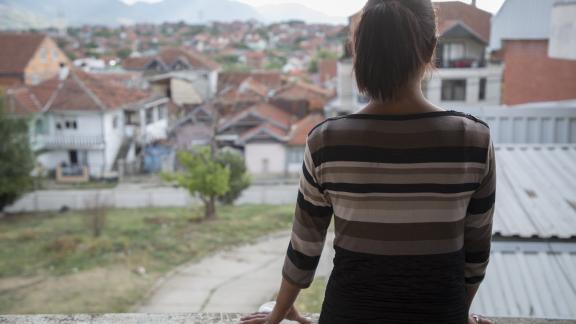When Mihaela (not her real name) was six years old, her father sent her onto the streets to scavenge for food for the family and beg for money to fund his alcoholism treatment.
“We were very poor,” she says. “I started going through containers, through dustbins. Then I started begging.”
At nine, Mihaela dropped out of school. By the age of 16, she was selling sex.
Mihaela grew up in Šuto Orizari – or Šutka – a sprawling, run-down neighbourhood on the edge of Macedonia’s capital, Skopje. Of the roughly 50,000 people living here, over three quarters are Roma.
Šutka is a lively place, abuzz with the patter of market traders. But it also faces huge social problems, from poverty, unemployment and illiteracy to gender-based violence and poor health. The community is ill-served by state social services and healthcare, and Roma people are often denied access to state services due to stigma and discrimination.
Mihaela married at 16 – a common age for girls in Šutka to marry. Roma tradition dictates that girls should be virgins upon marriage: Mihaela’s bedsheets were displayed outside the house after the wedding night for inspection by the community.
She left her husband shortly after marrying and began selling sex. She would arrange to meet clients – non-Roma Macedonians – by telephone, and meet them “downtown” in central Skopje, about half an hour away.
At 17, she married a Roma man from Kosovo and began a family: they now have six children, aged between two and ten.
Life was tough. “My husband was unemployed. I continued my work because I had to make money. I started doing everything, and he was just being lazy. I supported the whole family – I was working all day long, seeing two or three clients a day. In this community, women are the breadwinners.”
Four months ago, Mihaela’s husband left for Serbia, ostensibly to get hold of ID documents. “I don’t know if he’s going to come back or not and I can hardly stand the situation,” she says. “I am alone with the six children and it’s really difficult for me. My children are starving. There’s no one to look after them.”
Both Mihaela’s parents are now dead, and her only sibling, a brother, is blind and unable to help the family. “I don’t have any means of support,” she says. “Sometimes I want to hang myself.”
Roma families are often large and contraception rarely used within marriage. Mihaela’s husband insisted sex should be “natural”, while misinformation also played a role: “my husband wouldn't allow me to use condoms during sex because he told me that I would catch an infection.”
Abortion is frowned upon within the Roma community, while high fees and a controversial abortion law from 2013 make the procedure inaccessible for most. “I had the first two children out of love,” Mihaela says. “But when I became pregnant for the third time, I wanted to have an abortion but my father-in-law wouldn’t let me because they come from Kosovo and abortion isn’t allowed in their culture.”
Poverty forces her to work throughout each pregnancy, up until delivery. Mihaela’s eldest child, aged ten, now looks after the children in the evenings so she can go to work. Like many sex workers in Skopje, she meets clients on ‘Television Street’, on the north bank of the Vardar River, a short stroll from the city’s main square and tourist hotspots.
Life for street sex workers in Skopje is perilous. “Sometimes when you refuse to do something the clients want, you get beaten up,” Mihaela describes. The police also harass the women.
Mihaela earns between 500 and 1000 Macedonian denars a day – around US$ 9-19. “It’s not enough to feed six kids,” she says.
She insists on using condoms with clients, and gets them free at the Šutka branch of I Want to Know, a sexual health centre run by IPPF member HERA, a leading Macedonian sexual health organisation. Like many sex workers, particularly those from the Roma community, Mihaela is almost entirely reliant on NGOs for her sexual health and contraception needs.
She says she would be lost with the support of Nicolina Nikolovska, a social worker at the Šutka centre. “She organised IUDs [contraceptive coil] for me, provides condoms, advises me. If it weren’t for her, I would have been completely destroyed.”
“I have had HIV tests done here with Nicolina and I swear by this organisation for everything – literally everything – smear tests, STI testing, HIV testing, guidance and advice.”
Mihaela herself now acts as a “focal point”, encouraging other women to get HIV and STI tests at the centre or its mobile van. They are given brochures, contraception and lubricants as well as workshops on sexual health and rights.
She hopes to stop sex work one day. “If there was something else, I would gladly leave this job,” she says.
“This is why I now teach my kids and make them understand that I am in a bad situation – so they can learn from my mistakes and not make the same mistakes.”
“I wouldn’t want my children to do what I do, I wouldn’t want them to live how I live. That’s why I encourage them to go to school and get an education, move away from my life and learn from my mistakes, because I wouldn’t wish this on anyone, especially my kids.”
Photo: Mihaela looks out over the Roma neighbourhood of Shuto Orizari, credit: Jon Spaull/IPPF EN
This article was written in September 2017.
when
country
North Macedonia
Subject
HIV and STIs
Related Member Association
Health Education and Research Association (HERA) - North Macedonia









